THE GUARDIAN: Angrusori: Live at Tou review – Romany songs of birth, death and black comedy
(Hudson Records)
Using tango, flamenco, junkyard jazz and more, the pan-European group turn stories of migration, pain and persecution into something transcendent

One joy of listening to music in an unfamiliar language is that you can put any interpretation you like on the lyrics. The opening track on this LP, for instance, is an epic, pan-global miasma that conjures up countless images – the strings and organs provide a viscous drone that comes straight out of a Hindustani classical raga; the full-throated vocal harmonies sound like the work of a diaphonic Bulgarian choir; the heartbreaking chords recall Yiddish liturgical music. You could be forgiven for imagining that this is some sacred religious text set to music but, according to the translation in the CD booklet, it’s actually the story of feckless parents getting drunk on Johnnie Walker and finding that their children have been thrown in the river and eaten by fish.

It’s one of 11 traditional Romany songs on this album, often ancient ballads collected by the musicologist Jana Belišová while travelling among the Roma of Slovakia. The lyrics tend to be grim tales of birth and death, suffering and yearning, exile and persecution, but the remarkable musical settings elevate them into something transcendent and mystical.
Angrusori are a pan-European project led by Norway’s Kitchen Orchestra, an improvising ensemble who’ve collaborated with some of the world’s leading avant-garde musicians over the years. Here their featured star is the remarkable Iva Bittová, a Czech violinist, singer, actor and composer of Hungarian Gypsy ancestry, who brings with her some of central Europe’s finest Roma musicians. The Gypsy story is one of migration – from Gujarat to Andalucia – and the music here visits many stations along that journey. There are giddy tangos, mournful flamenco ballads and the kind of ecstatic, wordless vocals you associate with Qawwali Sufi music. There are also ambient recreations of birdsong (Oda Kale Čirikloro), a terrifying sci-fi drone that morphs into a klezmer waltz (Nadur Le Romendar O Cintiris), and an ululating a cappella vocal that mutates into a piece of Tom Waits-style junkyard jazz (Rodav Me Miro Dorm). The joyous, upbeat finale Joj, So Kerava comes as a surprise: black comedy in the face of misery. “Winter is coming, what will happen to me?” howls the narrator. “My girlfriend doesn’t want me. Neither does my beautiful wife.”
John Lewis, The Guardian, 7 May 2021 09.00 BST
Tags: angrusori














 ShareThis
ShareThis